- Home
- Amie Kaufman
This Shattered World Page 2
This Shattered World Read online
Page 2
He tugs me off the main path and into the shadows between the bar and the supply shed next door. Then it hits me: I’m not going to be making anyone run laps in the morning. I’m a military officer, being captured by a rebel. I’m probably never going to see my troops again, because I’ll be dead by morning.
With a snarl, I jam my hand back and down, sending the blade of the pink plastic cocktail sword deep into the guy’s thigh. Before he has time to react, I give it a savage twist and snap off the hilt, leaving the hot-pink plastic embedded in the muscle.
At least I won’t go without a fight.
The boys are playing with firecrackers in the alley, stolen from the strings in the temple. The girl watches through a hole in the wall, her face pressed against the crumbling brick. Yesterday it was the Lutheran priest’s turn in the temple, but tomorrow is a wedding, and it’s her mother’s turn to convert the tiny box of a building at the end of the street to match too-distant memories of traditional ceremonies on Earth.
The boys are lighting the firecrackers and seeing who can hold on to the red sticks longest before tossing them away to snap like gunfire in the air. The girl squeezes through a gap in the wall and runs to snatch a lit firecracker from the biggest boy. Her skin crawls with the hiss and heat of the fuse, but she refuses to let go.
PAIN SEARS DOWN MY LEG, and my grip loosens for an instant. She’s away like a flash.
I have only a split second to act, and if I miss, she’s going to kill me. I leap back as she swings at me, and the night is shattered by the sound of a gunshot. My gun. She goes sprawling into the mud with a gasp of pain, but I don’t have time to consider what damage I might have done. Everybody on the base will have heard the shot, and even with the echo bouncing around the buildings, they’ll find me soon enough.
I start to reach for her, but she’s already moving; she’s not badly hurt, or else adrenaline is holding her together. She kicks out, her foot connecting with my arm and numbing it from the elbow down. The gun goes sliding along the wet ground.
We both lunge after it. Her elbow jabs at my solar plexus, missing it by an inch—I’m left wheezing rather than half dead, dragging in air as I force myself to move. She scrambles ahead of me and I grab at her ankle, scrabbling in the mud to drag her back again before she can grab the gun or shout for backup.
She may be trained, but I’m fighting for my family, my home, my freedom. She’s fighting for a goddamn paycheck.
For a long moment there’s only the harsh staccato of our breathing as we fight to get ahead of one another. Then my hand finds the familiar grip of my grandfather’s pistol. I jab my elbow back at her face; she dodges it easily, but it throws her off enough for me to roll over and end up with the gun pointed between her eyes.
She goes still.
I can only see the dark, furious glitter of her eyes meeting mine. I can’t speak, too winded, too shell-shocked. Slowly, she lifts her hands, palms out. Surrender.
I want nothing more than to collapse in the mud. But I can hear the shouts of soldiers looking for intruders, hunting for the source of the gunshot. I’ve got no time. I need to get her to my currach—if I leave her here she’ll be found too quickly and I won’t have enough time to vanish into the swamp.
I give the gun a jerk, silently ordering the soldier to her feet. I stagger up myself, then grab for her arm to turn her around and twist it behind her back. I rest the barrel of the gun against her lower spine, where she can feel it.
My fingers are wet and sticky with her blood, but it’s too dark to tell how much there is. I know I hit her; I saw her fall. But she’s on her feet, so the wound isn’t slowing her down that much. I must have only grazed her side with the bullet.
I try to calm my breathing, listening for the soldiers. Getting off the base is going to be a hell of a lot harder now; I wish I had time to camouflage myself with the mud at our feet. Her skin’s brown and more difficult to see in the low lighting, but mine’s the pale white that comes from living on a planet with constant cloud cover. I practically glow in the dark.
“Well?” She’s panting. “What’s it going to be? You could at least have the decency to aim for my heart and not my head. I’ll look prettier at my funeral.”
“There’s something very wrong with you, Captain,” I tell her, keeping her close. Her black hair’s escaping her ponytail, tickling my face and getting into my eyes. “You don’t invite a thing like that around here.”
“As if you need an invitation,” she growls, and though she’s completely still, I can almost feel her humming with anger. I can’t let her go. She’d never let me go. She shoves back roughly, sending pain spearing down my leg.
I shift my grip on the gun, letting it press against her a little harder.
It was easy to get the new recruits talking, but their security clearance is way too low to have any useful information. But trying to get close to Captain Chase for information was another matter entirely. What was I thinking? Sean would laugh if he could see me now: the Fianna’s biggest pacifist holding Avon’s most notorious soldier at gunpoint.
“I’ll recognize your pretty face anywhere now, you know that.” There’s a smug satisfaction in her tone, underneath her anger. Like winning the point is what matters, even if it means she ends up dead. “You have to get rid of the problem.”
“Póg mo thóin, trodaire,” I mutter, tightening my grip. Kiss my ass, soldier.
Captain Chase lets off a string of what sound like insults in return, though I don’t understand the language. She doesn’t look like she’s got any Irish in her, probably has no idea what I said. But she recognized my tone, as easily as I can tell she’s cursing right back at me, speaking…Chinese, maybe? She looks like she might have that ancestry in her blood somewhere, but with the off-worlders it’s hard to tell. She gives a savage twist and then gasps as the movement wrenches at her wound. It’s lucky I managed to graze her, because I wouldn’t be able to keep hold of her otherwise. She’s even stronger than she looks.
My mind races. This isn’t over yet, and I can still turn it to my advantage if I think quickly. The recruits in the bar may not have known about the hidden facility to the east, but now I have a captain, and one who’s been on Avon longer than any other soldier. Who better to get me that info than the military’s golden child?
That facility scares me too much to ignore. Until I saw it a few hours ago, I’d never clapped eyes on it. I don’t know how they hid the construction. It appeared out of nowhere, surrounded by fences and spotlights. From the outside, there’s no way to tell what’s in there: weapons, new search drone technology, ways to destroy the Fianna we haven’t thought of. Until we know why the facility is there, every minute is danger.
I give her a shove and start moving toward the perimeter of the base, keeping to the shadows and away from the surveillance cameras. “Ever seen the beauty of the outer swamps?”
“I suppose out there they won’t find my body at all. Smart.”
“Does your platoon’s psych attendant know about this obsession with your own death?”
“Just trying to be helpful,” she mutters through gritted teeth. We’re not far from where I snuck in through their fencing. I’m sure on a more high-tech world, the perimeter would light up with lasers and six kinds of alarm bells, but out here beyond the edge of civilization, the soldiers are stuck with wire fences and foot patrols. Central Command spends as little as it can get away with to supply them, and it shows. On top of that, the last few months of ceasefire have made them lazy. Their patrols aren’t what they should be.
I can hear the search parties on the other side of the base, but here where it butts up against the town, it’s quieter. They always think the rebels will come from the swamp. Like we’re not smart enough to walk around to approach from the town, where there’s less protection.
I can tell she starts thinking about those search parties about the same time as I do—she draws breath to shout, and I dig the barrel of the gun into her skin
in warning. We’re both still for a long, tense moment as she decides whether to call my bluff. I’m praying she doesn’t. She lets the air out of her lungs in a furious capitulation.
I kick at the wire until the place I wound the severed ends back together gives way, and then we’re outside her territory and into the swamp beyond. The marsh stretches out before us into the gloom, mudflats and bare rock interspersed with a thousand winding creeks and streams. The water’s as muddy as the land and half concealed by reeds and rotting algae, so nobody but the locals can tell where the solid ground is until they put their feet down. The floating clumps of vegetation mean the waterways are constantly shifting—deeper, shallower, interconnecting in different ways each week as mud and algae flow sluggishly.
Most of the swamp is a murky black right now, the permanent clouds above us blocking any hint of light from the stars. We were taught there are a couple of moons up there too, somewhere, coaxing the waters to flow this way and that. But I’ve never once seen them—only the clouds, always the clouds. Avon’s sky is gray.
My currach is pulled up and beached on the mud by the fence, her flat-bottomed hull of sturdy plastene a battered contrast to the military patrol boats. I don’t mind her, though—she can go places they don’t even see, without making a sound. I push Jubilee ahead of me, down toward the water’s edge, and she growls a wordless protest.
“You know, most people find me charming.” I keep talking in her ear, hoping to keep her too distracted to think of a way out of this. “Even you looked keen on me for a sec there, Jubilee.” I hear her huff. Using her name annoys her for some reason—good. One more way to keep her off balance. “Maybe you just need to give me a second chance.”
I shove her forward into the currach and knock the lid off the fuel can with my foot. The crude gasoline we’re forced to use is so toxic, I can smell the fumes from here, but I grab her collar to shove her face down against the can. With an indignant protest she sucks in a lungful of vapor. It takes her a few seconds to push past the pain and work out what I’m doing, but she’s inhaled enough that her limbs don’t work. When she tries to push me away, her legs give out and she slips, wrenching free of me to thump down into the bottom of the boat.
For a moment our eyes meet in the dim light. Her gaze is furious as she struggles to stay conscious, trying to push up on one elbow. Then she’s gone, her head falling back to thunk against the plastene hull. I lean in carefully to peel back her eyelids, but she’s out. She’ll have a screaming headache when she wakes, but it’s better than hitting her over the head. Too easy to misjudge the blow and end up killing her instead.
Without wasting another second, I flick on the safety, stick my gun into my waistband, and shove off with my foot. The currach glides swift and silent through the water. I can’t risk a light, not when I can see the lights of the base security forces dancing behind me, still searching for the intruder. I navigate by feel, unclipping the pole from the gunwale and using soft, quick touches ahead and around me to make sure I’m keeping to the channel that will lead me away from danger.
By the time they get searchlights sweeping the stretch of swamp beyond the fences, I’m too far away for the light to reach. I keep expecting to feel a hand on my ankle, or the captain’s fist meeting my gut, but she doesn’t stir.
As soon as the sounds of shouts carrying across the water begin to fade and I can no longer see the distant lights of the base, I stop long enough to find my lantern and light it. We use algae to coat the glass, giving the light an eerie green-brown wash; occasionally the soldiers spot our boats or our signal lights, and the camouflage can make them dismiss what they’ve seen as the will-o’-the-wisps so feared in this swamp.
What they don’t know is that anyone who’d seen a real wisp could never confuse it with one of our lanterns.
I hang the lantern on its spur rising from the bow and turn back to the unconscious trodaire in the bottom of the currach. There’s no way out of this now. Whether or not she can shed light on what’s happening in the stretch of no-man’s-land east of the base, she knows my face. She may not know my name yet, but if she manages to connect me with my sister, she’ll personally lead the hunt until she has my head on a platter—she won’t need their so-called Fury as an excuse for taking me apart piece by piece.
Taking out Captain Chase would be a huge blow for the trodairí, and a triumph for us. I know at least two dozen Fianna who would shoot her without hesitation and sleep just fine tonight. If I came back with her body, my people would love me for it.
I let my breath out slowly, and my thumb hovers over the safety on my grandfather’s pistol tucked in my waistband. But that way is a pit, one my sister couldn’t escape once she fell into it.
I’ve heard more stories about this girl than any ten other trodairí put together. They claim she’s the only one unaffected by what the soldiers call Avon’s Fury. Probably because she doesn’t need to fall back on that thin excuse to commit violence against my people—according to the stories, she practically embraces it. They talk about how she single-handedly cleared out the resistance cell on the southern edge of TerraDyn territory. How the soldiers under her command are the fastest to respond, the first on the scene, the fiercest fighters. How she skins rebels alive just for fun.
I wasn’t so sure about that last one until I saw how she looked at me after I pulled my gun on her. But at least one of the stories is true. My cousin Sean nearly got his head blown off by her platoon a week after she took command, and when I asked him what she was like, he said she was mind-twistingly hot. He had that part right. If only she weren’t a murderer-for-hire.
My best hope is to force her to tell me what she knows about the facility—maybe even get me inside for a look around—then split. At least I’ll have a head start when the hunt begins.
I tear my eyes away and concentrate once more on the pole. The currach glides true through the water, my path lit only a few meters ahead by my dim green lamp. I ought to feel better, lighter, with every minute I put between us and the bright lights of the base, but I know this is not a victory. The soldier in the bottom of my boat will stop at nothing to kill me and escape when she wakes; and if the rest of the Fianna discover I have her, they’ll stop at nothing to kill her. Our ceasefire will be over, my people forced once more into a war they cannot hope to win.
I have to work fast.
This time the dream is fragmented, arriving in razor-edged shards that don’t fit together and slice at her memory. The girl is on Paradisa, and she’s trying to climb a wall. Time’s up, yells the sergeant, making her arms shiver with exhaustion as her toes scrabble for purchase against the plastene.
She wants to let go and drop to the ground. But when she looks down, her mother is there, with that always-tired sigh, that soft-eyed hint of disappointment. Her father is there, hands grimy in grav-engine grease, a bullet hole in his head.
The sergeant shouts at her again to give up and this time she screams back, using a word that will later earn her a week digging trenches.
There are too many ghosts down there to let go.
I’VE GOT THE HANGOVER FROM HELL. My head’s pounding; how much did I have to drink at Molly’s last night? Except that’s impossible. I haven’t had a hangover since the morning after I was finally accepted into basic training. It was technically three weeks shy of my sixteenth birthday, and therefore illegal for me to drink. But after I tried to get into the military for three years running by lying about my age, they finally caved and bent the rules. What was three weeks? Odds were I’d be dead within the year anyway. Might as well let the cannon fodder have a few beers first.
But once was enough. It wasn’t the drinking or even really the hangover that got me—it was being less than capable on my first day of training. There, all it meant was that I didn’t make the best first impression on my instructors, and let my sparring partner pin me in less than a minute. No big deal.
But out here, being at less than one hundred percent coul
d mean death. And I’ve never had more than a few drinks at a time since then.
So why do I feel like tossing the contents of my stomach all over the floor?
The ground sways under me, and I force my eyes open, ignoring the way my eyelids feel like they’re lined with sandpaper. The first thing I see is the blank, slate-gray expanse of Avon’s unchanging night sky. I try to sit up and fall over sideways, making the floor shudder and sway; my hands are bound and tied to something. A flash of agony rips up my side, carrying with it the memory of a bullet splitting my skin.
“Bad idea, Captain,” says an infuriatingly cheerful voice somewhere above and behind me. “If you capsize us, I don’t really fancy your chances of swimming to solid ground while tied to a sinking boat.”
I lift my head, squinting at the guy standing backlit over me.
Romeo.
“At least if I drown,” I wheeze, my voice sounding like gravel, “your friends won’t have the pleasure of stringing me up from the rafters at your little hideout.”
Romeo narrows his eyes at me, brows drawing in as he pushes us off a clump of vegetation with one of the long poles the natives use. “We don’t hang soldiers,” he retorts with exaggerated outrage. “We burn them at the stake. It takes ages to collect the fuel, given the landscape. It’s quite a special occasion.”
I snort, using the sound to disguise the creak as I test the strength of the boat rib I’m tied to. Despite how shoddy-looking the boat is, the rib doesn’t give. But being tied up is the least of my problems.
Avon’s perpetual cloud cover means there’s no navigating by starlight, the way we’re trained to do in survival situations. The swamp stretches as far as the eye can see, giving me no reference points, no way to tell what direction we’re going. Even the occasional spires of rock thrusting upward look alike. They’re sharp as razor blades; Avon’s only had wind and water to erode them for a few generations, barely a heartbeat in geological time. The waterways between islands and floating masses of vegetation shift so rapidly that from day to day, the same patch of swamp can look entirely different. I have no idea where we are. And being lost, on Avon, is deadlier than being a soldier in the middle of a pack of bloodthirsty rebels.

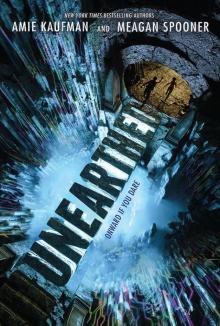 Unearthed
Unearthed Obsidio
Obsidio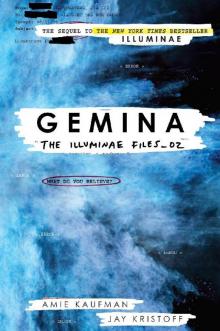 Gemina
Gemina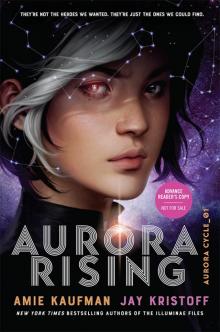 Aurora Rising (ARC)
Aurora Rising (ARC)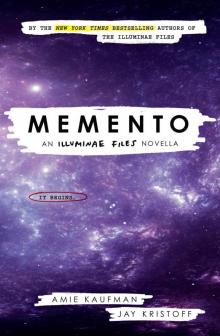 Memento
Memento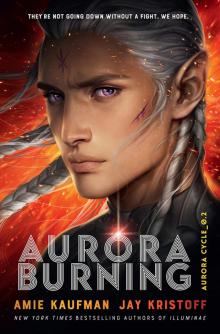 Aurora Burning: The Aurora Cycle 2
Aurora Burning: The Aurora Cycle 2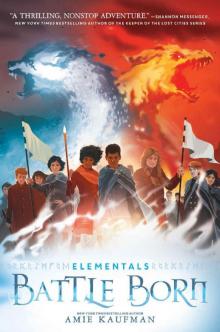 Elementals: Battle Born
Elementals: Battle Born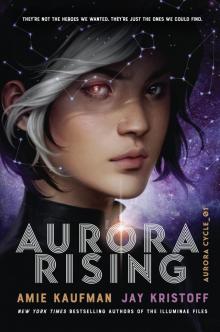 Aurora Rising
Aurora Rising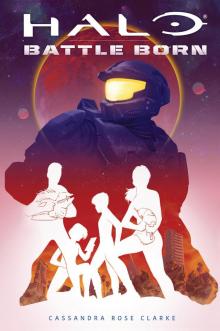 Battle Born
Battle Born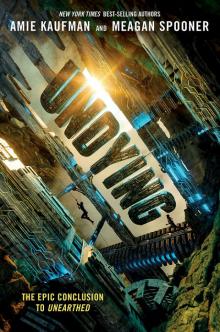 Undying
Undying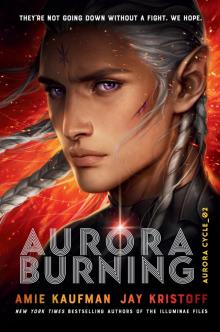 Aurora Burning
Aurora Burning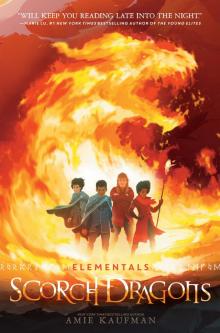 Scorch Dragons
Scorch Dragons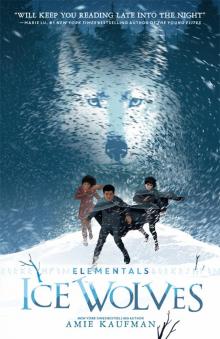 Ice Wolves
Ice Wolves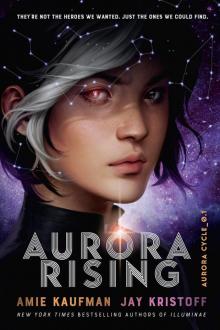 Aurora Rising: The Aurora Cycle 1
Aurora Rising: The Aurora Cycle 1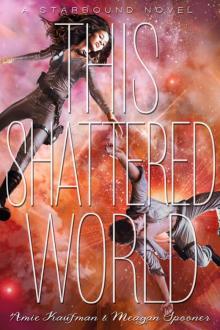 This Shattered World
This Shattered World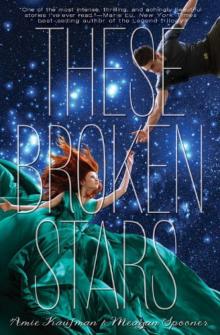 These Broken Stars
These Broken Stars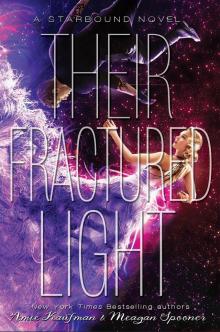 Their Fractured Light: A Starbound Novel
Their Fractured Light: A Starbound Novel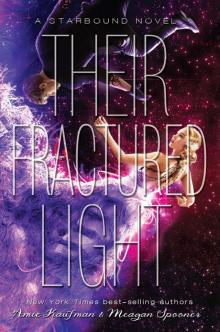 Their Fractured Light
Their Fractured Light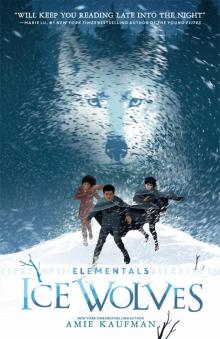 Ice Wolves (Elementals, Book 1)
Ice Wolves (Elementals, Book 1)